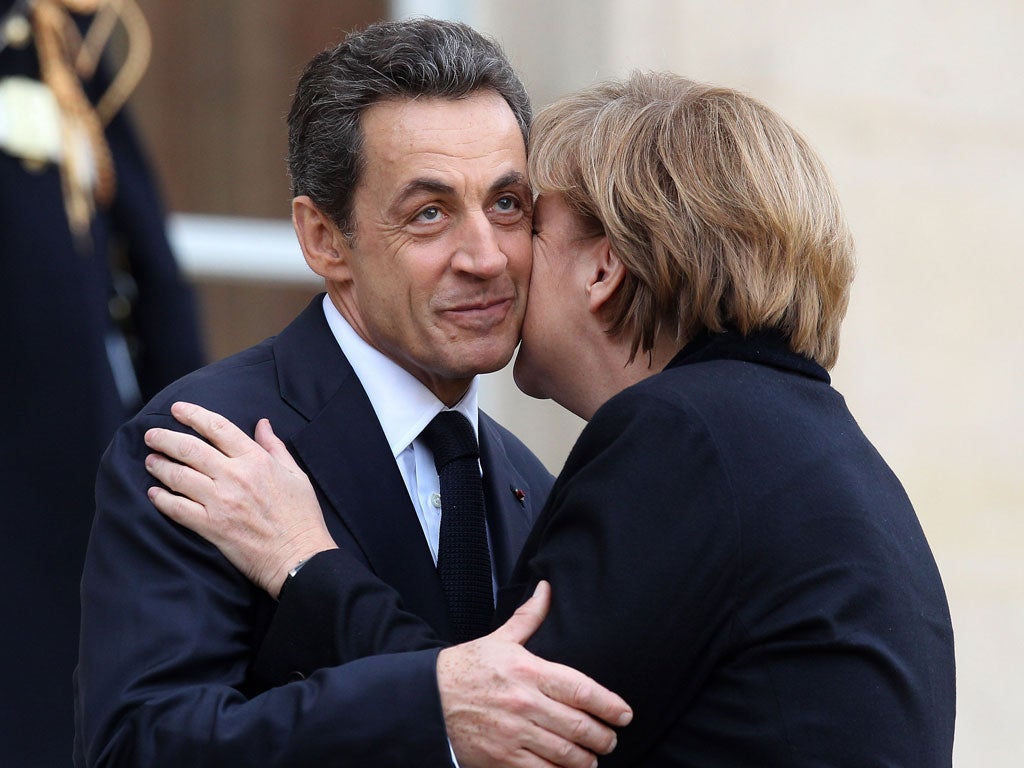Sealed with a kiss: Europe's power couple agree to closer fiscal union
Sarkozy and Merkel outline deal to save the euro – but will other leaders join the party?

Your support helps us to tell the story
From reproductive rights to climate change to Big Tech, The Independent is on the ground when the story is developing. Whether it's investigating the financials of Elon Musk's pro-Trump PAC or producing our latest documentary, 'The A Word', which shines a light on the American women fighting for reproductive rights, we know how important it is to parse out the facts from the messaging.
At such a critical moment in US history, we need reporters on the ground. Your donation allows us to keep sending journalists to speak to both sides of the story.
The Independent is trusted by Americans across the entire political spectrum. And unlike many other quality news outlets, we choose not to lock Americans out of our reporting and analysis with paywalls. We believe quality journalism should be available to everyone, paid for by those who can afford it.
Your support makes all the difference.Hopes of an enduring solution to the eurozone debt crisis soared yesterday after France and Germany proposed a new treaty to impose budgetary discipline and restore confidence in the euro.
President Nicolas Sarkozy and Chancellor Angela Merkel will ask other EU leaders later this week to approve sweeping ideas for a new, or amended, EU treaty to punish countries that allowed deficits to spin out of control.
Although falling short of the federalist "fiscal union" that Germany had demanded, the plans would impose near-automatic penalties on countries that broke agreed budget and debt limits. All euro members would be expected to introduce a "golden rule", enshrining the principle of balanced budgets in their constitutions.
Overall, the plan comes somewhat closer to the kind of "inter-governmental" agreement demanded by Mr Sarkozy than the stricter euro-federalist proposals put forward by Ms Merkel. But the ideas follow German doctrine in rejecting the concept of eurobonds, or state debt underwritten by the eurozone. An unspoken understanding exists that the European Central Bank will extend its short-term help to heavily indebted nations once the new rules are approved.
Ms Merkel and Mr Sarkozy, speaking after talks in Paris, said they hoped their ideas would win broad approval from other EU leaders at a summit in Brussels on Thursday and Friday. They hoped that the details of a "new" or amended treaty could be finalised by March.
The first reaction of bond and stock markets was enthusiastic. And there was a further fillip for the eurozone last night when the International Monetary Fund approved the latest – €2.2bn (£1.9bn) – tranche of loans to Greece.
But some of the gloss came off last night when Standard & Poor's warned that it was considering cutting the ratings of 15 eurozone countries. The ratings agency said it had put the likes of Germany, France and Austria, which have been considered Europe's safest government debt issuers, on "creditwatch negative" because of the turmoil in the eurozone. Only two countries that use the euro weren't affected: Cyprus already had that designation and Greece already has ratings low enough to suggest that it's likely to default soon anyway.
The French and German leaders left open the crucial question of how their ideas would be framed in treaty form: should there be a new treaty or amendments to the existing treaty or a protocol? Mr Sarkozy and Ms Merkel said that they would ideally like all 27 EU countries to sign up but would settle for a "second-best" agreement by the 17 euroland countries alone.
This appeared to leave an escape route for David Cameron, who is resisting Eurosceptic pressure for concessions to the UK in other areas if the existing EU treaty is redrawn.
This week's summit has been widely seen as the last chance for European leaders to stop the euro from capsizing. Ms Merkel said that euroland had to earn the trust of investors.
"The belief that we can be taken at our word has suffered," she said. "We want structural changes which go beyond agreements. We need binding brakes on debt."
Ms Merkel dropped her demand that the European Court of Justice should have the ultimate word in punishing states that breach debt rules. It was agreed only that the European Court should have a role in checking that member states had introduced a rule on balanced budgets. Yet the proposals go some way towards meeting German demands for "automatic" penalties.
In quotes: what they said
Angela Merkel
We are in a difficult situation and we need to regain trust, as the belief that we can be taken at our word has suffered ... This package shows that we are ... determined to keep the euro as a stable currency and as an important contributor to European stability."
Nicolas Sarkozy
"We want to make sure that the imbalances which led to the [crisis] situation in the eurozone today cannot happen again.
Join our commenting forum
Join thought-provoking conversations, follow other Independent readers and see their replies
Comments